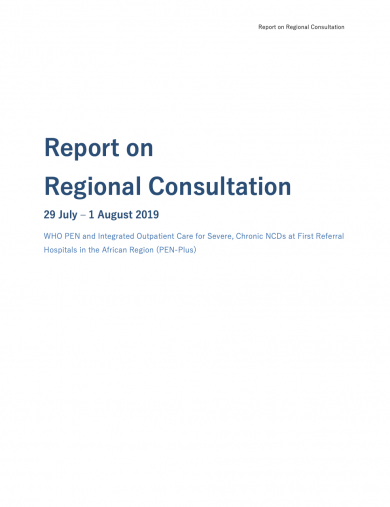
WHO PEN and integrated outpatient care for severe, chronic NCDS at first referral hospitals in the African region (PEN-PLUS) - Report on regional consultation
The dynamic burden of NCDs in Africa encompasses both urban and rural settings with varying prevalence and severity across a broad spectrum of demographics. As urban-based, referral hospitals are frequently the only facilities, which may have reliable, broad NCD services, WHO released the Package of Essential NCD Interventions (WHO PEN) to support the decentralization of services to the primary care level. Adopted in 2010, this approach seeks to provide geographically accessible care at community health centers to treat common NCDs, including hypertension, type 2 diabetes, and chronic respiratory disease, in an integrated outpatient package. WHO PEN also looks to address early detection of breast and cervical cancer. Since 2010, several WHO AFRO member states have piloted and scaled WHO PEN. As a means to complement WHO PEN services, some member states have additionally begun focusing on the more severe spectrum of NCDs, such as type 1 diabetes, rheumatic heart disease, and palliative care for advanced malignancies. Given the greater complexity of services for these diseases, care delivery has primarily focused at first-level hospitals, as opposed to health centers. This approach to address severe NCDs through an integrated outpatient service at first-level hospitals is called “PEN-Plus.” In order to address the dynamic and broad spectrum of NCDs within the context of universal health coverage (UHC), WHO AFRO recognizes the importance of continuing to scale WHO PEN across the region while exploring an expansion of decentralized services through PEN- Plus.


